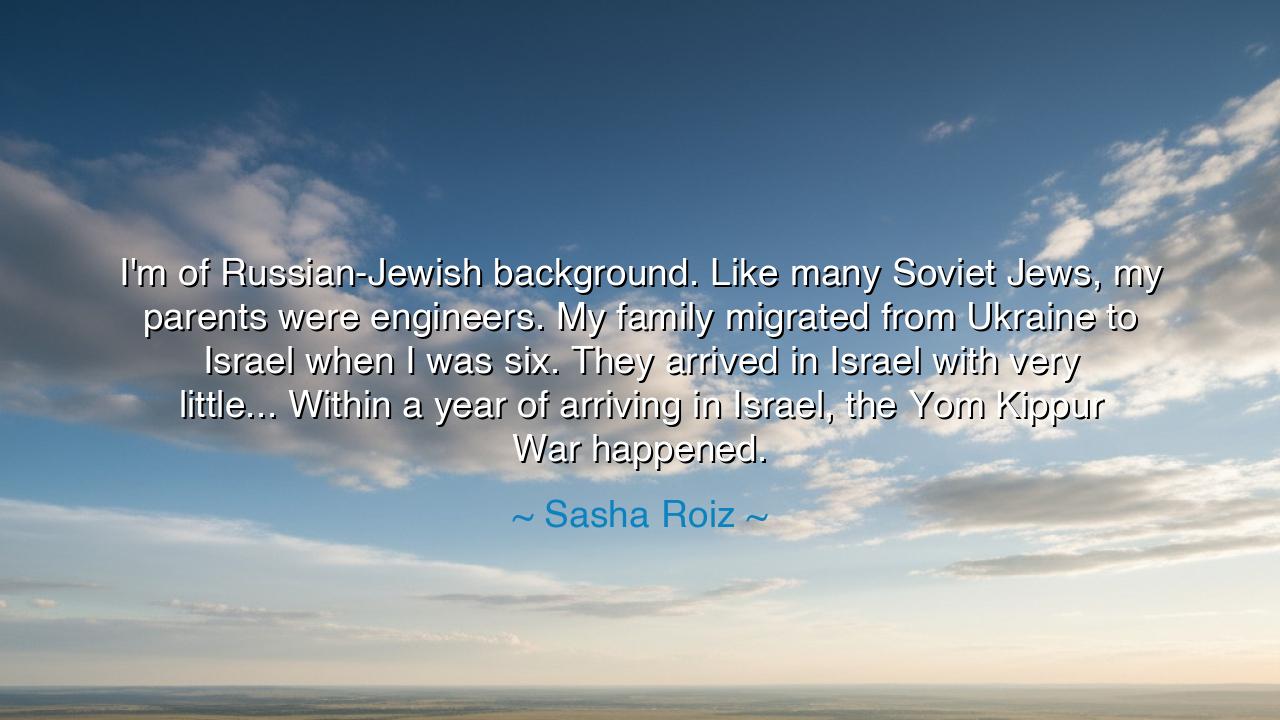
I'm of Russian-Jewish background. Like many Soviet Jews, my
I'm of Russian-Jewish background. Like many Soviet Jews, my parents were engineers. My family migrated from Ukraine to Israel when I was six. They arrived in Israel with very little... Within a year of arriving in Israel, the Yom Kippur War happened.






Host: The room feels quiet, with the soft glow of the lamp casting a warm light across the space. Outside, the world has settled into the calm of the evening. Jeeny sits on the couch, her legs tucked beneath her, deep in thought. Jack, standing near the window, looks out at the darkened world outside, lost in reflection. The peaceful atmosphere seems like the perfect setting for a conversation about heritage, migration, and the forces that shape our lives.
Jeeny: “Jack, I came across a quote from Sasha Roiz today that really struck me,” she says softly. “He said, ‘I’m of Russian-Jewish background. Like many Soviet Jews, my parents were engineers. My family migrated from Ukraine to Israel when I was six. They arrived in Israel with very little... Within a year of arriving in Israel, the Yom Kippur War happened.’ What do you think about that?”
Jack: He turns slowly, a thoughtful expression crossing his face. “It’s such a powerful snapshot of how the forces of history can shape a person’s life. Sasha Roiz is describing a migration that was not just about seeking a better life, but about being thrust into the chaos and challenges of a new country and a new identity. The fact that they arrived in Israel with so little, only to be immediately swept into the turbulence of the Yom Kippur War, shows how unpredictable and difficult life can be, even when you’re trying to start over.”
Jeeny: “Exactly. It’s almost as if their migration was the beginning of a series of life-altering events. Moving from Ukraine to Israel is already a huge transition — and then to be faced with the war shortly after arriving, that must have been incredibly difficult. Sasha Roiz is showing how even the most ordinary experiences of migration are often shaped by larger political and historical forces. It’s a reminder of how much people’s lives can be defined by the circumstances around them, even if they don’t fully understand or control them.”
Host: The light in the room feels softer now, as if their conversation is touching on something more profound about identity, migration, and the challenges that come with both. Jeeny speaks with an understanding that Roiz’s story is not just one of personal migration, but a story that intersects with the larger events of history. Jack stands still, reflecting on how personal histories are shaped by the broader currents of time.
Jack: “I think what stands out to me is the resilience of it all. Sasha Roiz’s family arrived with very little, and then within a year, they’re faced with the trauma of war. It’s incredible that they were able to adapt, survive, and build a life, even in the face of such overwhelming challenges. The fact that Roiz’s story starts with this migration and continues through such significant historical events speaks to the strength of the human spirit in the face of adversity.”
Jeeny: “Yes, and it also speaks to the power of identity. Moving from Ukraine to Israel must have been a profound shift in terms of culture and environment, and the war only added to that upheaval. But through it all, their identity as Soviet Jews, and the shared experience of being part of that community, probably played a huge role in helping them navigate those difficult times. Sasha Roiz’s story isn’t just about the migration itself, but about the larger experience of displacement, adaptation, and survival that so many people face when they are forced to start over.”
Host: The conversation deepens as they reflect on the ways in which migration, war, and identity shape not just individuals but entire families. Jeeny and Jack both agree that Sasha Roiz’s story is one of survival and resilience, not just in terms of physical endurance but in terms of maintaining identity and connection in a rapidly changing world. Roiz’s words remind them that our personal histories are often deeply intertwined with larger political and historical forces, and those forces shape who we are in ways we may not always recognize.
Jack: “It’s almost like migration and war are both forms of disruption. They force you to reframe your identity, your sense of stability, and your relationship to the world. But the strength comes in how you adapt and hold on to what matters most — whether it’s family, community, or a sense of purpose. Sasha Roiz’s family had to rebuild in a way that few people experience, but their resilience is what ultimately defines their story.”
Jeeny: “Yes, and it’s such a powerful reminder of the impact that historical events have on individuals and families. Sasha Roiz’s migration story is deeply personal, but it’s also shared by millions of others who were displaced by similar political upheavals. The world changes, and people are forced to change with it, but the strength and adaptability they show in doing so is what keeps their stories alive.”
Host: The room feels quieter now, as if the weight of their conversation has settled into something deeper. Jeeny and Jack reflect on how personal migration stories are often shaped by larger historical events, and how resilience, adaptation, and community are essential in navigating such challenges. Sasha Roiz’s words serve as a reminder that, in the face of displacement and adversity, it’s the ability to adapt and rebuild that defines our stories.






AAdministratorAdministrator
Welcome, honored guests. Please leave a comment, we will respond soon